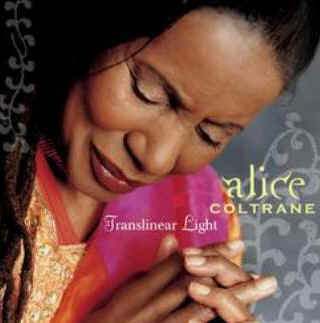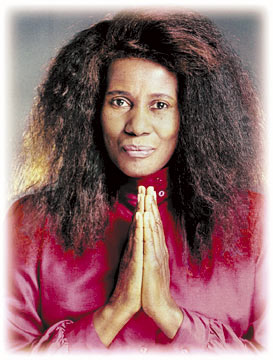
-
 Toshiko Akiyoshi
Toshiko Akiyoshi - Geri Allen
- Andrews Sisters
- Angela Andrews
- Lil Harden Armstrong
- Dorothy Ashby
- Pearl Bailey
- Beverly Barkley
- Karen Briggs
- Ruth Brown
- Diane Cameron
- Betty Carter
- Joan Cartwright
- Kim Clarke
- Gloria Coleman
- Alice Coltrane
- Sasha Daltonn
- Dorothy Donegan
- Ella Fitzgerald
- Gloria Galante
- Rita Graham
- Jace Harnage
- Billie Holiday
- Bertha Hope
- Shirley Horn
- Lena Horne
- Alberta Hunter
- Jus' Cynthia
- Sandra Kaye
- Emme Kemp
- Vinnie Knight
- Lavelle
- Peggy Lee
- Abbey Lincoln
- Melba Liston
- Gloria Lynne
- Tania Maria
- Marian McPartland
- Carmen McRae
- Mabel Mercer
- M'zuri
- Sandy Patton
- Trudy Pitts
- Cheryl Porter
- Shirley Scott
- Nina Simone
- Bessie Smith
- Dakota Staton
- Carol Sudhalter
- Monnette Sudler
- Sarah Vaughn
- Dinah Washington
- Ethel Waters
- Mary Lou Williams
Alice Coltrane, 69; performer, composer of jazz and New Age music; spiritual leader
By Jon Thurber, Times Staff Writer
January 14, 2007
Alice Coltrane, the jazz performer and composer who was
inextricably linked with the adventurous musical improvisations of her
late husband, legendary saxophonist John Coltrane, has died. She was 69.
Coltrane died Friday at West Hills Hospital and Medical Center in West
Hills, according to an announcement from the family's publicist. She had
been in frail health for some time and died of respiratory failure.
Though known to many for her contributions to jazz and early New Age
music, Coltrane, a convert to Hinduism, was also a significant spiritual
leader and founded the Vedantic Center, a spiritual commune now located in
Agoura Hills. A guru of growing repute, she also served as the swami of
the San Fernando Valley's first Hindu temple, in Chatsworth.
For much of the last nearly 40 years, she was also the keeper of her
husband's musical legacy, managing his archive and estate. Her husband,
one of the pivotal figures in the history of jazz, died of liver disease
July 17, 1967, at the age of 40.
A pianist and organist, Alice Coltrane was noted for her astral
compositions and for bringing the harp onto the jazz bandstand. Her last
performances came in the fall, when she participated in an abbreviated
tour that included stops in New York and San Francisco, playing with her
saxophonist son, Ravi.
She was born Alice McLeod in Detroit on Aug. 27, 1937, into a family with
deep musical roots. Anna, her mother, sang and played piano in the Baptist
church choir. Alice's half brother Ernie Farrow was a bassist who played
professionally with groups led by saxophonist Yusef Lateef and vibes
player Terry Gibbs.
Alice began her musical education at age 7, learning classical piano. Her
early musical career included performances in church groups as well as in
top-flight jazz ensembles led by Lateef, guitarist Kenny Burrell and
saxophonist Lucky Thompson.
After studying jazz piano briefly in Paris, she moved to New York and
joined Gibbs' quartet.
"As fascinating and influential as her later music was, it
tended to obscure the fact that she had started out as a solid,
bebop-oriented pianist," critic Don Heckman told The Times on
Saturday. "I remember hearing, and jamming with, her in the early
'60s at photographer W. Eugene Smith's loft in Manhattan. At that time she
played with a brisk, rhythmic style immediately reminiscent of Bud Powell.
"Like a few other people who'd heard her either at the loft or during
her early '60s gigs with Terry Gibbs, I kept hoping she'd take at least
one more foray into the bebop style she played so well," he said.
She met her future husband in 1963 while playing an engagement with Gibbs'
group at Birdland in New York City.
"He saw something in her that was beautiful," Gibbs, who has
often taken credit for introducing the two, told The Times on Saturday.
"They were both very shy in a way. It was beautiful to see them fall
in love."
Gibbs called her "the nicest person I ever worked with. She was a
real lady."
She left Gibbs' band to marry Coltrane and began performing with his band
in the mid-1960s, replacing pianist McCoy Tyner. She developed a style
noted for its power and freedom and played tour dates with Coltrane's
group in San Francisco, New York and Tokyo.
She would say her husband's musical impact was enormous.
"John showed me how to play fully," she told interviewer Pauline
Rivelli and Robert Levin in comments published in "The Black
Giants."
"In other words, he'd teach me not to stay in one spot and play in
one chord pattern. 'Branch out, open up … play your instrument
entirely.' … John not only taught me how to explore, but to play
thoroughly and completely."
After his death, she devoted herself to raising their children. Musically,
she continued to play within his creative vision, surrounding herself with
such like-minded performers as saxophonists Pharaoh Sanders and Joe
Henderson.
Early albums under her name, including "A Monastic Trio," and
"Ptah the El Daoud," were greeted with critical praise for her
compositions and playing. "Ptah the El Daoud" featured her
sweeping harp flourishes, a sound not commonly heard in jazz recordings.
Her last recording, "Translinear Light," came in 2004. It was
her first jazz album in 26 years.
Through the 1970s, she continued to explore Eastern religions, traveling
to India to study with Swami Satchidananda, the founder of the Integral
Yoga Institute.
Upon her return she started a store-front ashram in San Francisco but soon
moved it to Woodland Hills in 1975. Located in the Santa Monica Mountains
since the early 1980s, the ashram is a 48-acre compound where devotees
concentrate on prayer and meditation.
Known within her religious community by her Sanskrit name,
Turiyasangitananda, Coltrane focused for much of the last 25 years on
composing and recording devotional music such as Hindu chants, hymns and
melodies for meditation. She also wrote books, including "Monumental
Ethernal," a kind of spiritual biography, and "Endless
Wisdom," which she once told a Times reporter contained hundreds of
scriptures divinely revealed to her.
In 2001 she helped found the John Coltrane Foundation to encourage jazz
performances and award scholarships to young musicians.
In addition to Ravi, she is survived by another son, Oren, who plays
guitar and alto sax; a daughter, Michelle, who is a singer; and five
grandchildren. Her son John Coltrane Jr. died in an automobile accident in
1982.
jon.thurber@latimes.com





